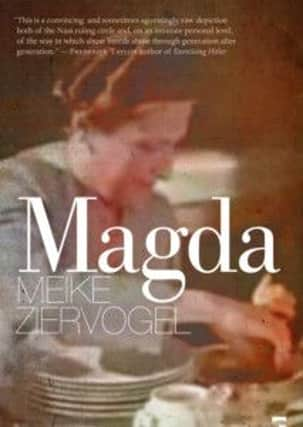Book review: Magda by Meike Ziervogel


Magda Goebbels, wife of Hitler’s propaganda minister Joseph Goebbels, crushed cyanide tablets between her children’s teeth as they slept in Hitler’s bunker in the dying days of the Second World War. She then killed herself.
It was an act that shocked, even in a world where murder and inhumanity had become all too commonplace, and one that has tended to be brushed over in post-war books on the Third Reich.
Advertisement
Hide AdAdvertisement
Hide AdMeike Ziervogel’s compelling debut novel goes far beyond Magda Goebbels’ own explanatory note that she took the children with her because they were ‘too good for the life that would follow.’
Instead, Ziervogel seeks out the childhood forces of abuse and neglect which Magda herself would not have recognised but which may well have programmed her obsessive, quasi-religious adoration of the Führer.
It’s a brave move by the German-born founder of London-based publishing house Peirene Press. Many of her fellow countrymen would understandably prefer to bury their painful past rather than seek to resurrect the lives of the architects of such world misery.
But Magda is a triumph of complex, cross-generational, feminist psychology, a spellbinding mix of fact and fiction which offers no sympathy or alternative reasoning for Frau Goebbels’ acts of murder but instead is an audacious attempt to give an understanding of how the unwanted, illegitimate daughter of a simple domestic servant could have risen to become a Nazi icon of motherhood and, ironically, the killer of her own children.
Advertisement
Hide AdAdvertisement
Hide AdIt is a harrowing account of the fatal fall-out from abusive mother and daughter relationships and a terrifying example of unloved daughters destroying the people they love, and then themselves.
Magda is born at the beginning of the 20th century to 22-year-old Auguste Behrend who feels burdened with a daughter she does not want.
Dispatched to a convent in Brussels by her zealously Catholic father, the girl is bullied and beaten by cruel, loveless nuns whose mantra is ‘What doesn’t kill you makes you stronger.’
Magda grows up to become an ambitious woman, desperate for love and recognition and when she meets up-and-coming politician Joseph Goebbels, he appears to answer all her needs, and together they produce six children who become symbols of the Nazi ‘family.’
Advertisement
Hide AdAdvertisement
Hide AdBut it is Adolph Hitler who really answers her needs. His pseudo parental pretensions feed her fantasy of herself, her husband and the Führer as the Biblical Mary, Joseph and God, an image compounded by Joseph Goebbels’ own vehement presentation of Hitler as the ‘German Messiah.’
But by the end of the war, Magda has become physically and emotionally ill. Her marriage to the philandering Goebbels is a sham and as she takes her children into the bunker, her eldest daughter Helga experiences an overwhelming sense of foreboding...
Written through the emotive narrative perspectives of Magda, her mother and 14-year-old Helga, Ziervogel’s short but powerful novel succeeds in taking us beyond rigidly accepted notions of the ‘evil’ Nazi wife and into more free-thinking territory where even a disturbing character like Magda Goebbels can at least be seen as a product of her nature, nurture and her husband’s propaganda.
A daring and intelligent debut.
(Salt, paperback, £9.99)